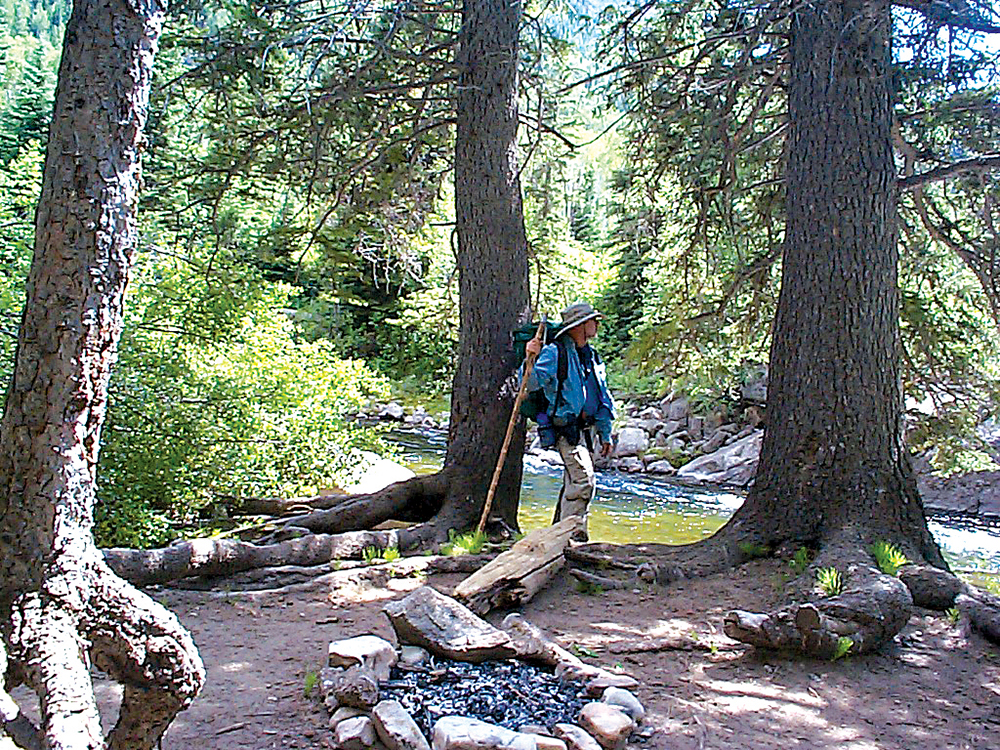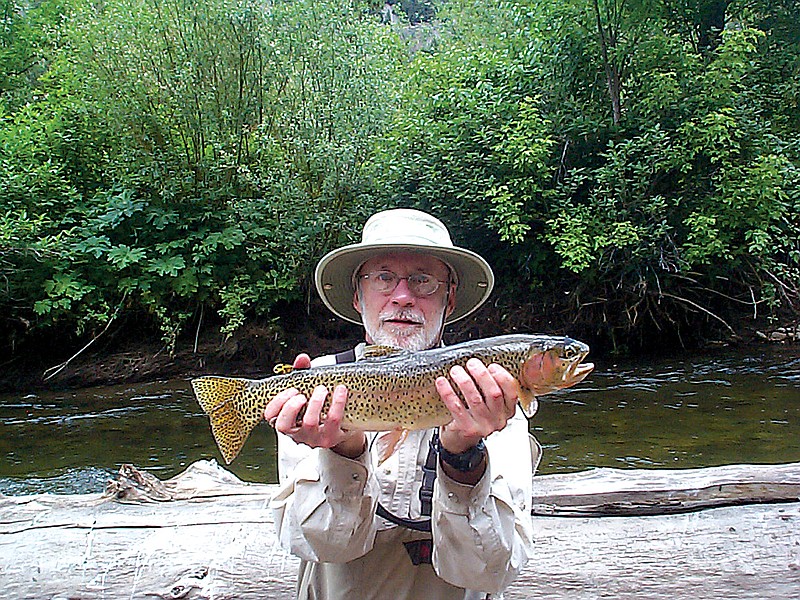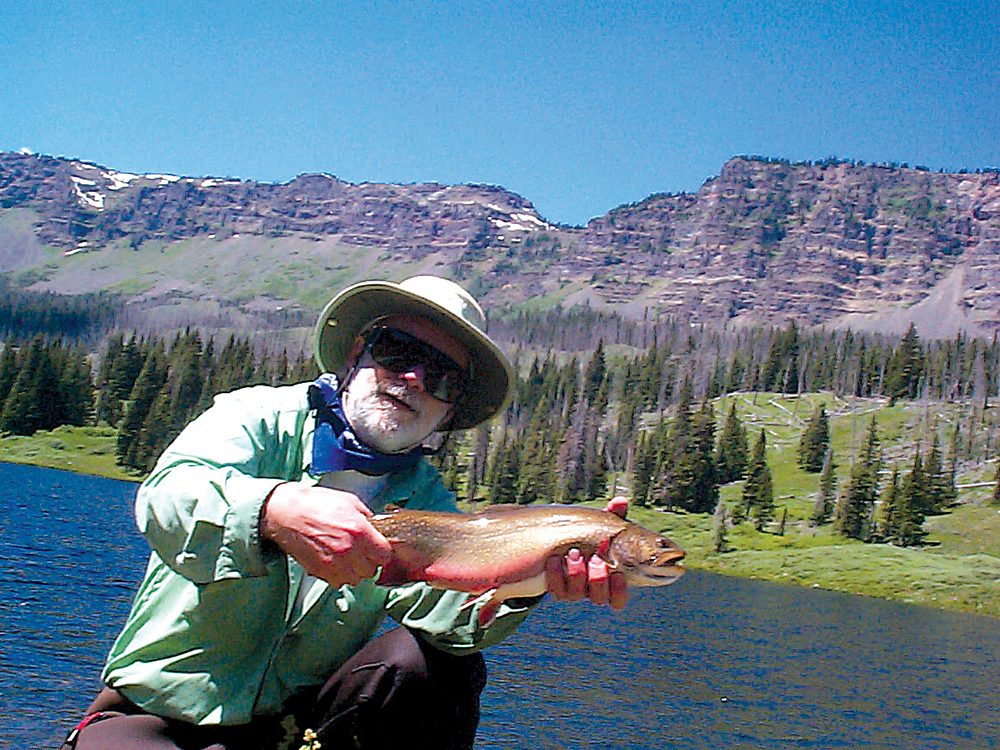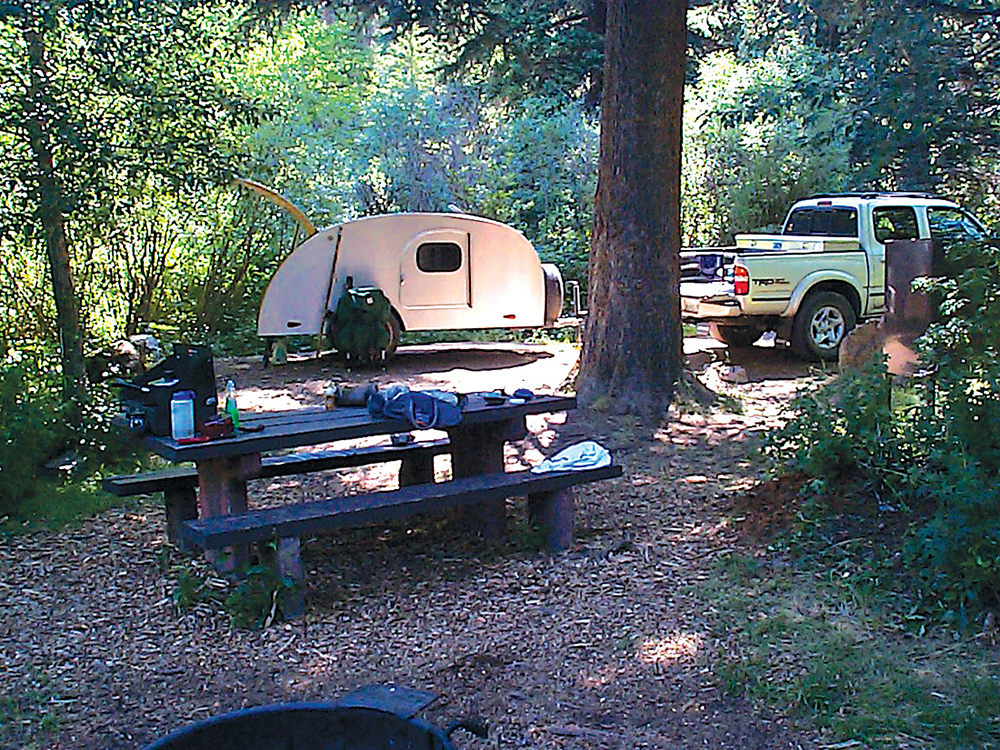Some of the greatest rewards in fly fishing have little to do with fish. The nature of the pursuit takes you to gorgeous places, and the adventures you have while trying to fool fish with a wad of feathers wrapped around a hook are the stories retold over and over around campfires.
Chattanooga's Mike Fitzsimmons has lived enough of those stories to write a book. He's a 60-something-year-old electrical engineer and writer who spends summers at Colorado campgrounds to feed his trout-fishing addiction. He's compiled decades of experiences into short stories for his book, "Adventures of a Dry-Fly Junkie."
We caught up with Mike to conduct a little Q&A about his thoughts on traveling and camping to fly fish. Here's what he had to say.
Get Out Chattanooga: You've lived in several places and traveled extensively. What do you think about Chattanooga since landing here seven years ago?
Mike Fitzsimmons: I like Chattanooga. It reminds me quite a bit of Austin, Texas, where I lived prior to Tennessee. A river runs through the middle of town, there's a college, and it is a vibrant little city. I like to bike on the riverwalk up to the dam or down to St. Elmo. Even the downtown area has a nice outdoor feel with the footbridge and the park and all. The people here are generally pleasant and friendly.
Get Out: Briefly explain your experience backpacking and camping to fish?
Mike: When I was a kid, my parents had a Starcraft trailer, and we camped from Louisiana up to New York and back every summer. We loved it, and so did our dog. After college, I began backpacking and camping much more. But once I got into fly fishing, it definitely went to a higher level.
I have been backpacking into the wilderness areas of Colorado for 25 years. I have a 40-year-old aluminum frame East Mountain Sports backpack that I still use to this day. It's got everything I need in it, down to the moleskin I found indispensable on a Grand Canyon hike. My lightweight tent finally died, so for overnight stays now I typically lie under the stars with a small tarp in my pack in case it rains.
Get Out: What do your Colorado trips look like?
Mike: My annual summer trips out West are a primary motivator in my life to stay fit and healthy so I can tackle the Rocky Mountains and the rivers I fish.
One summer after I quit my engineering job, I stayed in a tent and fished almost every day for close to three months all over the Rockies. It was a blast and the closest I've ever come to feeling truly free. Nowadays, I drive out with a fully packed truck and haul a small teardrop trailer. I camp the entire time and move from river to river, typically visiting campgrounds where I have stayed before, but I try to go to at least one new place every year to keep it fresh.
From the campgrounds, I typically backpack into the wilderness for a few miles to get away from people. I am pretty much a solo fly fisherman. After 25 years, there are only three or four guys who I'll fish with. I'm pretty picky, I guess.
A typical day might start with a big cup of hot coffee, packing my backpack with all my fly-fishing gear and food and hiking a few miles before caching the pack and morphing from trail hiker to fly fisherman. I'll jump in the river and work my way upstream, sometimes for miles. Toward late afternoon, I'll head back to my pack on the trail, change back into my hiking gear and crawl back to camp — typically tired but feeling really good.
Then I'll make dinner, drink a beer or two, crawl into the trailer at dark and fall asleep reading a good book. Next day — rinse and repeat. This goes on until I run out of ice or beer, at which point I have to run into town. That can blow an entire day, but over the years I've found places that let me take hot showers, which is always nice. There are restaurants I hit up in towns, too, but it's always nice to get back to my little trailer.
Get Out: What's your philosophy on gear?
Mike: When it comes to gear, I am definitely a minimalist. That starts with the teardrop trailer, which is nothing more than a sheltered bed on wheels. I have a small battery that lasts all summer because all I have inside is some LED [lights] to read by.
I actually prefer tent camping, but when the droughts in Colorado got so bad in the early 2000s, I had so many bear issues I got to where I wasn't sleeping well. So, I got the teardrop which is nice because it's small, light, and I can hook it up in minutes. It doesn't cost but about 1.5 [miles per gallon] additional gas to pull it. And it has two doors... so if the bear comes in one, I go out the other.
My Tacoma and teardrop are the perfect fly-fishing rig because I can tow it across long and bumpy dirt roads in the wilderness areas — no problem. I'd likely have torn up a bigger rig years ago.
Get Out: What was your most dangerous encounter?
Mike: Probably a moose I ran into. He had a big rack and came straight at me while I was tangled in some brambles next to the river. Moose are very aggressive for two reasons. One, they are at the top of the food chain and no black bear wants to mess with a bull moose. Two, their eyes are on the sides of their head, so their peripheral vision is decent, but if they are looking straight ahead, they tend to walk straight toward the movement to investigate.
I thought I was safe because I was on the other side of the river, but he came straight at me and into the river. I was actually trying to get my camera out to get a picture of him but soon realized getting a picture shouldn't be my top priority. I pulled out my knife and tried reflecting the sun into his eyes, while also holding my rod up high and making myself as big as possible. Not sure if it was anything I did, or if the deep hole in the river (the reason I was in the brambles to begin with) was too much for him, but he backed up and moved downstream. At that point, I was able to get a picture of him.
I tell the entire story in my book. It was a very cool experience, but it was kind of dicey there for a bit. When I first started camping in the Rockies, I had an irrational concern about bears. Now, I am much more worried about moose and mountain lions.
Get Out: Any advice on dealing with wildlife?
Mike: My advice for dealing with wildlife is to remain as calm as possible. My experience is that wild animals seem to quickly sense fear, panic or instability, for lack of a better word. The more calm, cool, collected and quiet you are, the more amazing things you are likely to see and experience. Many wild animals seem to be relatively accepting of me in the wilds. I like that. I like that a lot.
Get Out: Most interesting human encounter? Advice on dealing with humans?
Mike: There have been so many characters along the way. Many are good experiences; a few are not so good.
I don't have a lot of patience with inexperienced people at campgrounds or in the wild, especially if they don't respect nature, wildlife or other humans' privacy and boundaries. So, in general, my best advice on dealing with people is to stay away from them. That said, you learn to spot the people to stay away from and to choose friends judiciously. You can make amazing friendships that you can learn a great deal from, and that can last you a lifetime.
 Photo contributed by Mike Fitzsimmons
Photo contributed by Mike Fitzsimmons
I am a self-taught fly fisherman. When I was younger, it didn't take long to figure out that if you wanted to learn about fly fishing, you find the oldest guy around and make friends. Then just keep your eyes and ears open.
The second year after I started fly fishing, I met an old guy on the river one afternoon. We sat on the bank and spent hours just jawin' together. He gave me incredible advice and many invaluable tips. Yeah, make friends with the old guys.
Many of these characters are in my book as well. I've been very fortunate with good experiences. At one campground, the host's wife brought hot blueberry muffins to my campsite every morning. There was a family that invited me over for amazing dinners every night. Apparently, they felt sorry for me because I was alone.
One year, I injured myself on the river and limped back to my trailer. I guess word got around that I didn't look too good. There was a nurse in the campground, and when she got wind of it, she knocked on my door. She brought ice for my injury, medication and checked on me every few hours. I will never forget her — such a caring person. And I had never seen her before in my life.
Get Out: What's your philosophy on your impact and interaction with wildlife and wild places?
Mike: Rule No. 1: Pack out what you pack in. Period. As for fly fishing, I practice catch-and-release 99% of the time, and I use barbless hooks and try to release fish as quickly as possible, making sure they are revived and healthy before letting go. I do not fish if the water is too warm or the flow is low, and fish are stressed out. This problem is getting more common with global warming.
If I have a fish that cannot be revived, I'll keep it and eat it. There's no sense in wasting it. Sometimes I keep fish to eat in the backcountry if I am running low on food. Some of those high-mountain streams have tons of small brook trout. They have red meat, are very high in protein and so tasty. All you have to do is cut off their heads and gut them. The skin is so thin you can fry them up just like that and eat the skin, too.
Get Out: What is it about trout and dry flies that is so appealing?
Mike: I'm a dry-fly bigot because I am addicted to seeing a fish rise to my fly and take it. You don't really get the same buzz with sub-surface fishing. There is nothing better than seeing a rising fish and feathering down a dry fly and watching him take it. It's addictive. Plus, I like the action of casting dry flies and working a river upstream for miles.
Get Out: Any advice for folks who'd like to experience adventures similar to yours?
Mike: My advice is to just pack up your vehicle with camping and fly-fishing gear and head out to Colorado, Wyoming or Montana. Look for the most off-the-beaten-path wilderness areas. Camp as near as you can to a river or trailhead and hike in at least 4 miles. I've found that's a bit farther than most are willing to go, and you will likely find fantastic fishing. If you are relatively quiet and observant, you will be rewarded with awesome wildlife encounters you will never forget.
Get Out: How do we get a copy of your book?
Mike: If you are lucky, the Winder Binder Bookstore or Rock Creek on the North Shore or The Hatch Outfitters in Chattanooga may still have a copy. Otherwise, you need to go to Amazon.com and search for "Adventures Of A Dry-Fly Junkie" by Michael Fitzsimmons.


